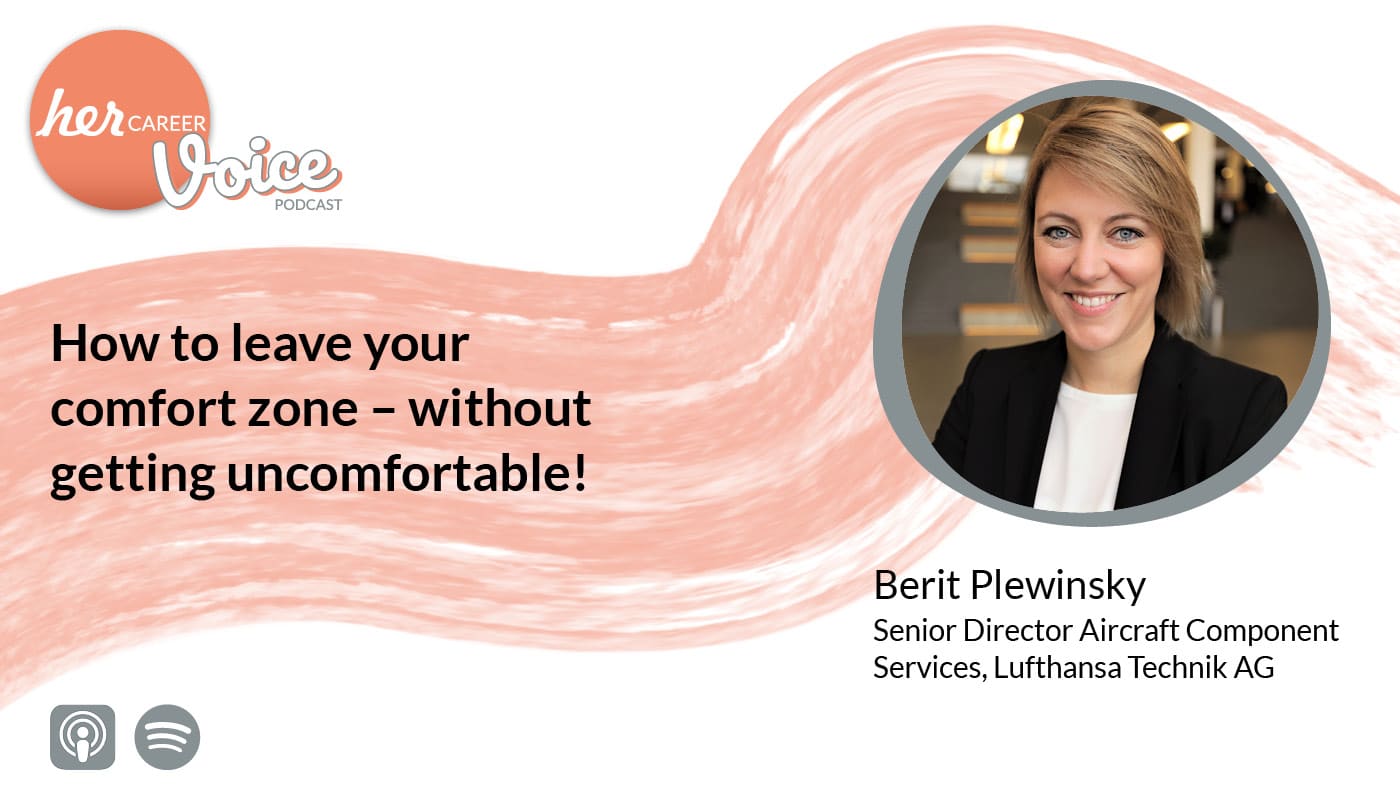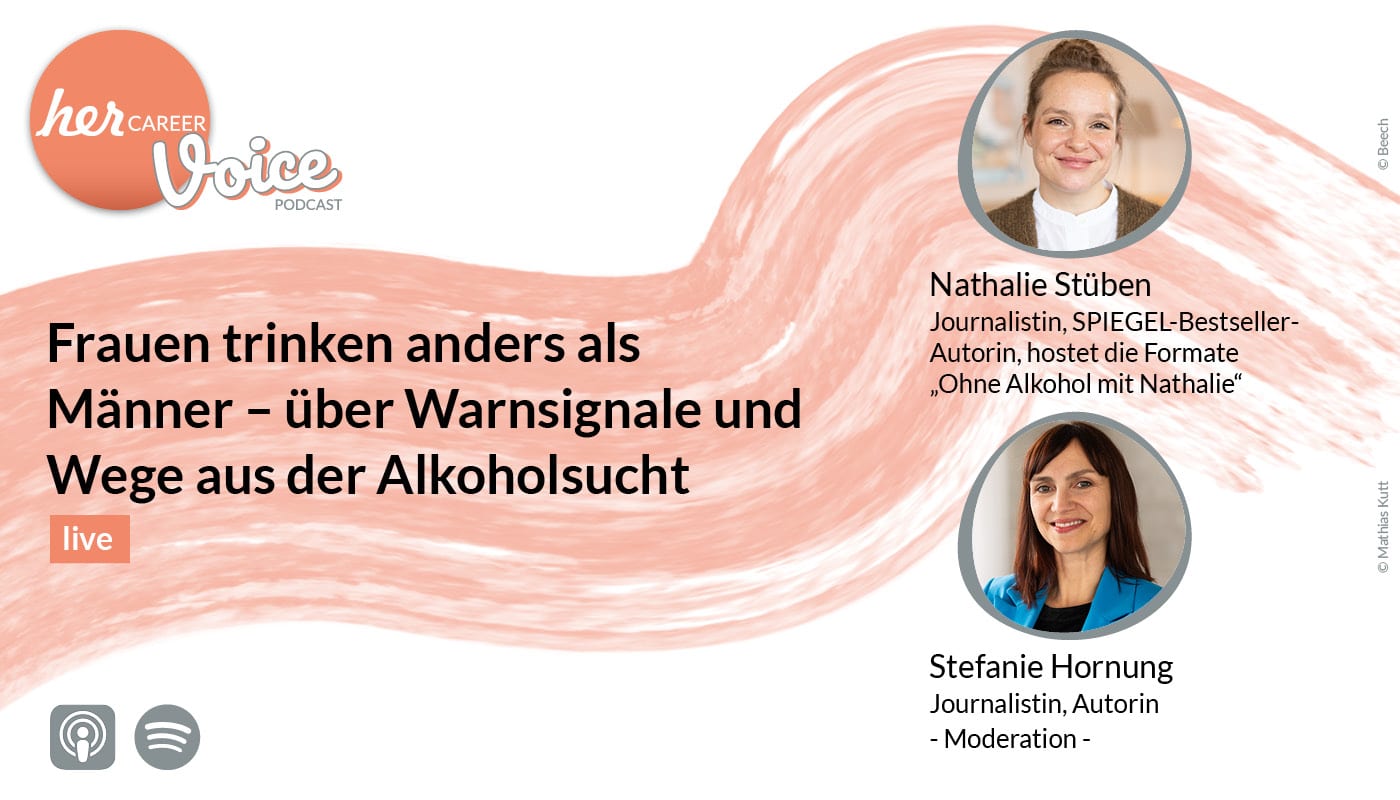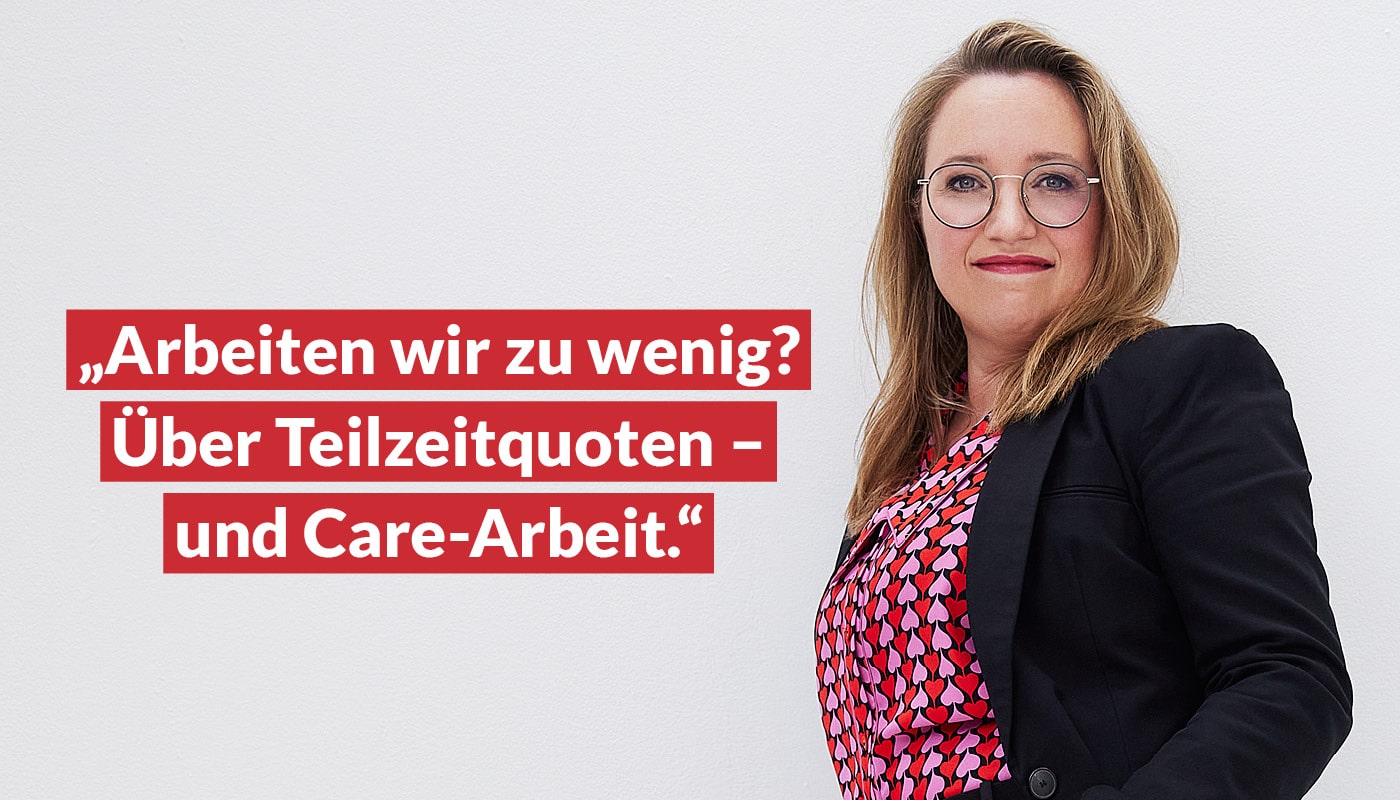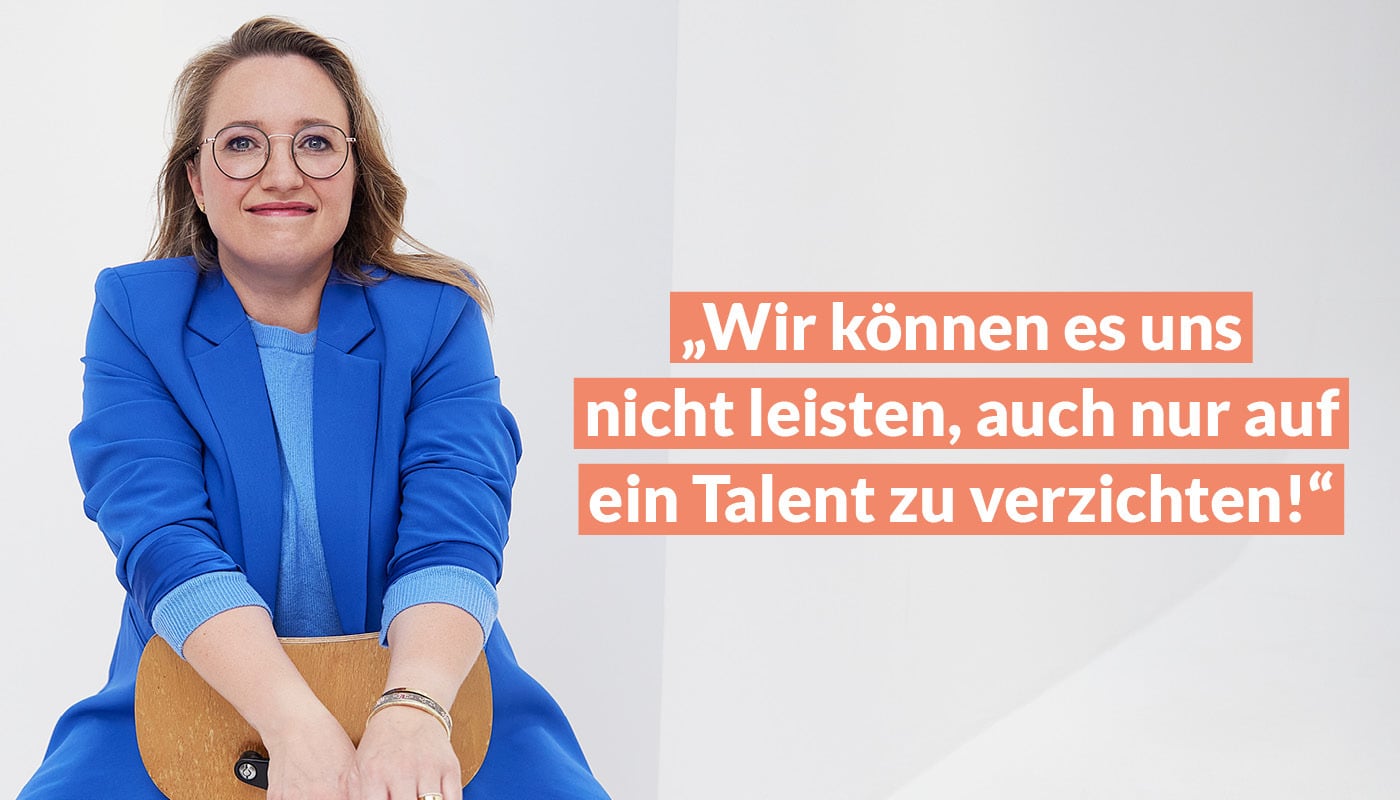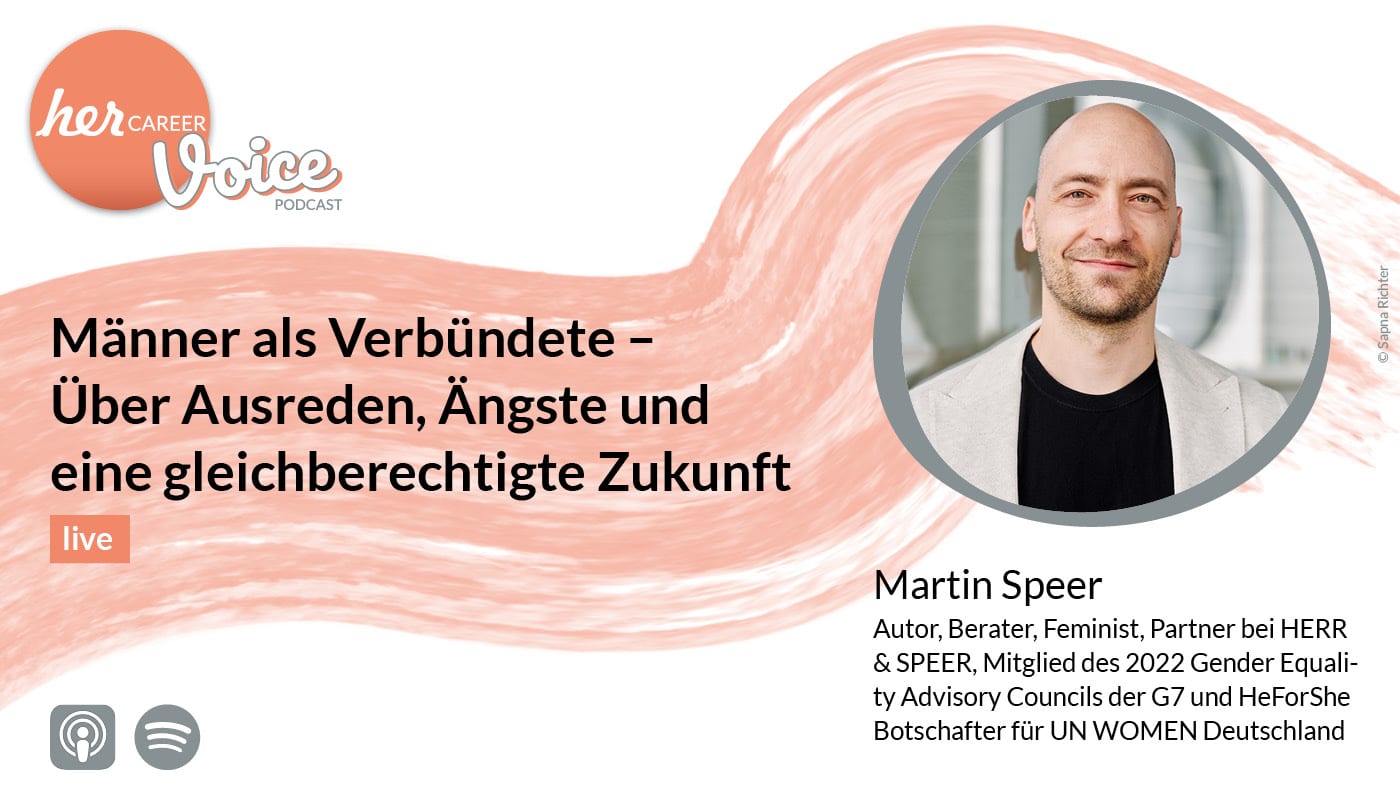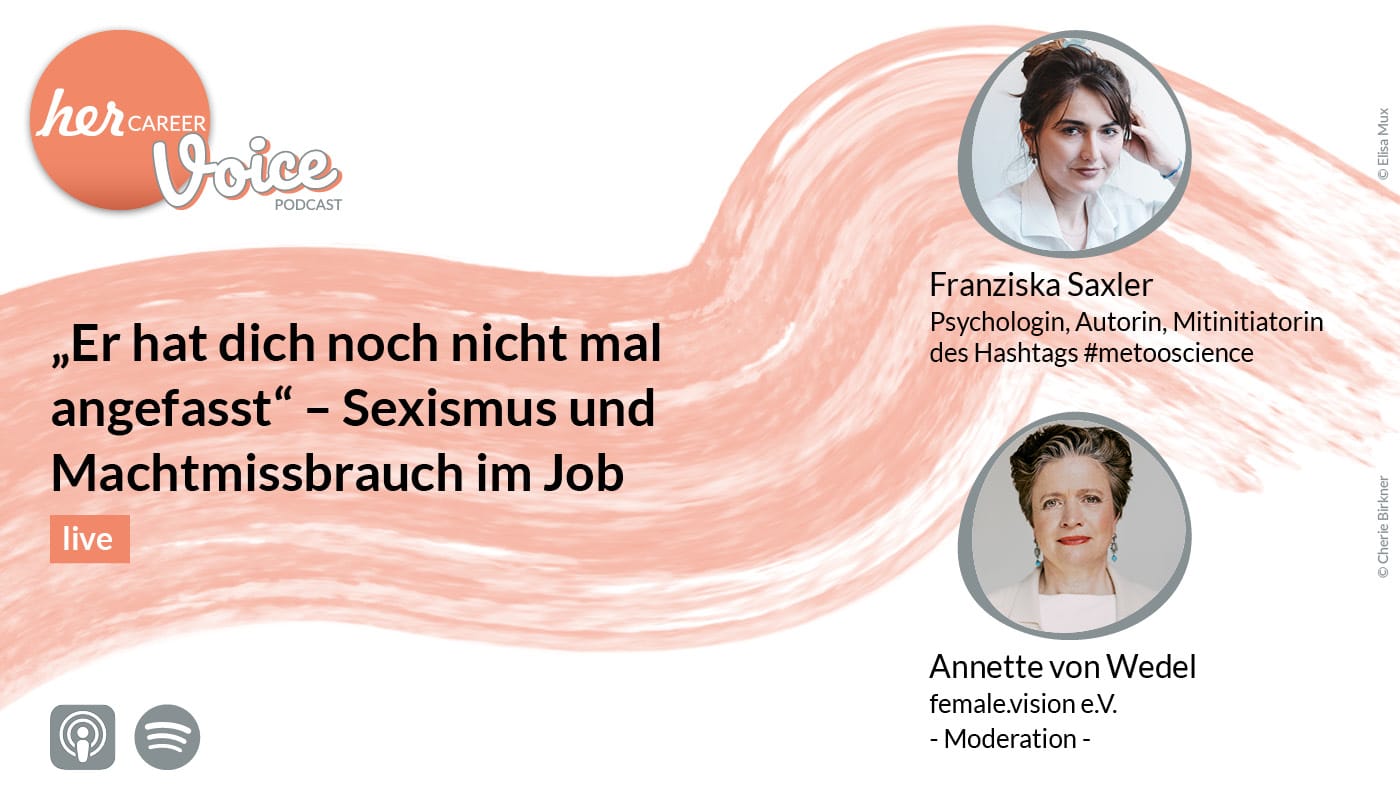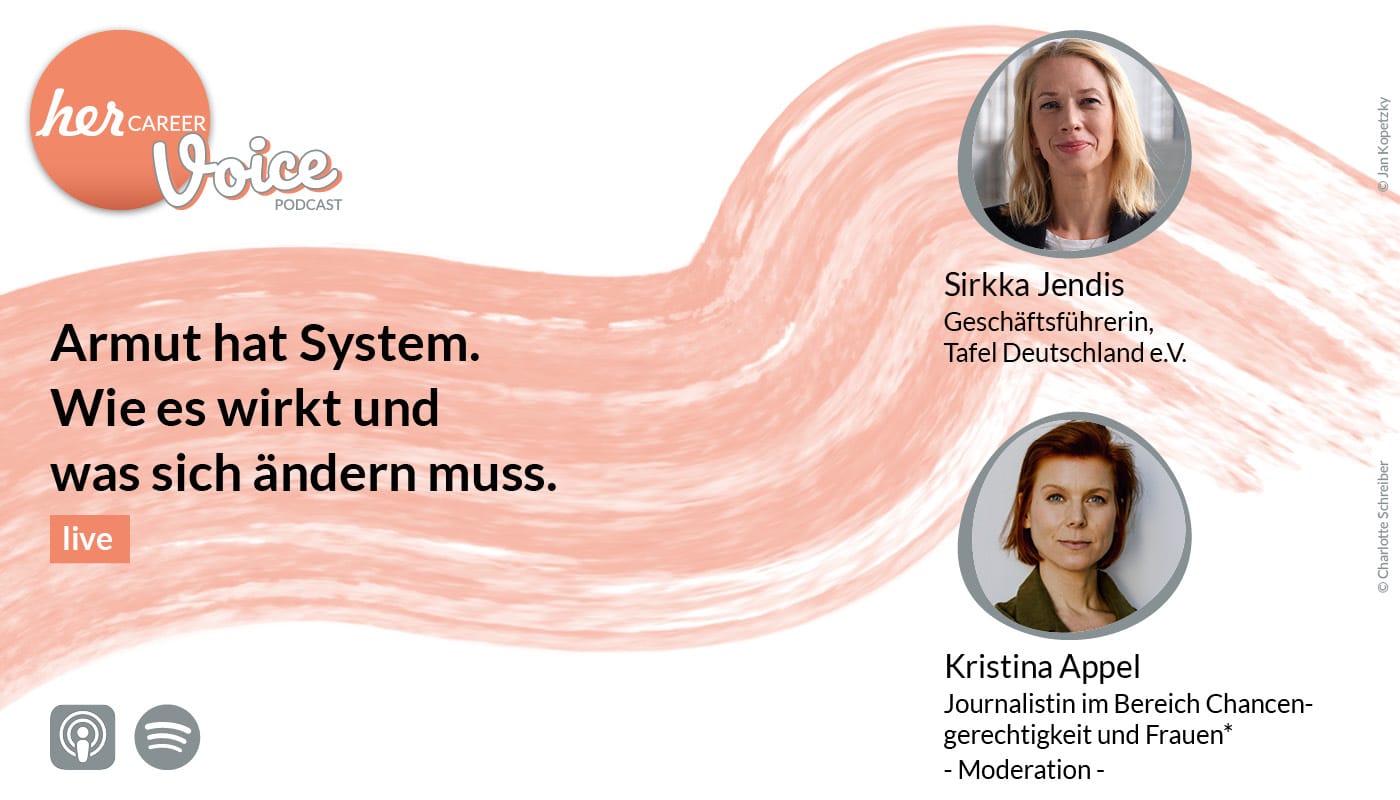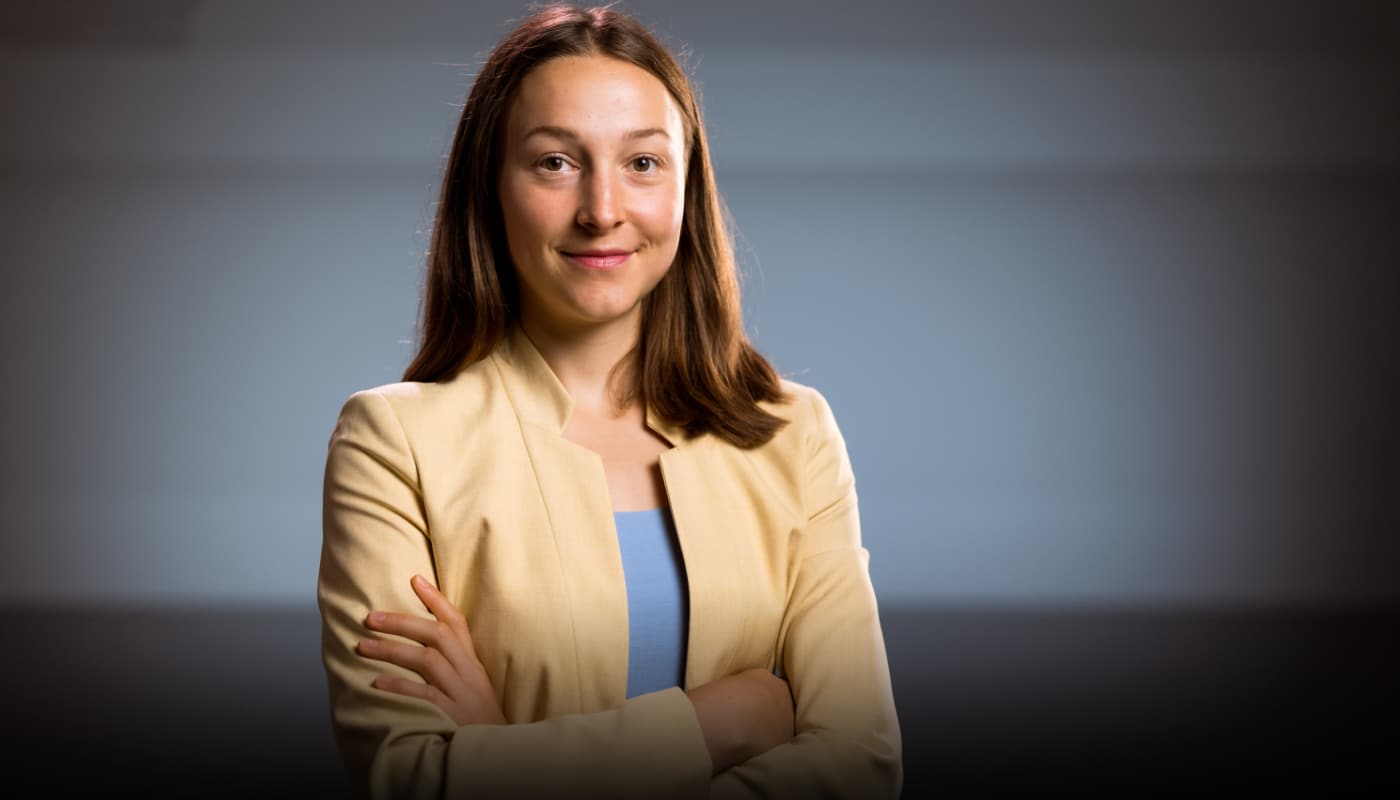Since Berit Plewinsky started as a trainee at Lufthansa Technik, she has continuously taken over more responsibility. Today, she works as a Senior Director, leading more than 150 people in different countries. Her success is based on her curiosity and willingness to leave the comfort zone on a regular basis.
Julia Hägele, editor in chief of herCAREER, talked with Berit about, how pausing and reflecting on your milestones helps you to plan your next steps, what to do, when you stop believing in yourself and why a network of supporters makes everything much easier.
Topics
Career & Job Application | Leadership & Communication | Science, Digitalization & Technology
Details about the speaker
Berit Plewinsky is currently Senior Director and leads a sales and customer service department for aircraft components at Lufthansa Technik. She studied Industrial Engineering at the Technical University of Berlin and started at Lufthansa Technik as a “StartTechnik” trainee. Afterwards, she held various leadership positions in different segments and areas of Lufthansa Technik. Today, she is responsible for a large and global organization that provides component services and solutions for its airline customers around EMEA.
[00:00:00] Berit Plewinsky: If you say, okay, I’m really good at presentations now. And I remember that I used to be really bad at this. Then, you know, you got there, you know that you can then take the next step and have it in you to take that forward to where you want to be. It shows you that you’ve been capable of so much that you’re also capable of more.
[00:00:32] Julia Hägele: Welcome to the herCareer podcast, where people who are committed to a diverse and fair working world have their say live from our Expo and from our community. Since Berit Plewinsky started as a trainee at Lufthansa Technik, she has continuously taken over more responsibility. Today, she works as a senior director, leading more than 150 people in different countries. Her success is based on her curiosity and willingness to leave the comfort zone on a regular basis. I’m Julia, editor-in-chief of herCareer. In our podcast, Berit told me how pausing and reflecting on your milestones helps you to plan your next steps, what to do when you stop believing in yourself, and why a network of supporters makes everything much easier.
[00:01:32] Julia Hägele: So, welcome Berit. Thanks for joining the herCareer podcast.
[00:01:37] Berit Plewinsky: Thank you for having me.
[00:01:38] Julia Hägele: Would you mind telling us something about your current role at Lufthansa Technik?
[00:01:42] Berit Plewinsky: Yes, I’m responsible for a department that provides airlines with components. So under components, you can pretty much understand everything that you take out of an aircraft, like a coffee machine, but also hydraulic components or even the screws, nuts and bolts that are built within the aircraft. Also thrust reversers, which are much larger than the screws and nuts and bolts I was just talking about. And what we do, is, we sell or we repair or we lease them to airlines and we provide them with the material. And my department, it’s 150 people and 12 locations, and they’re responsible for product sales but also customer service and just ensuring that we provide the contracts like we sold them and ensuring that the airlines really get their material on time and at the right locations.
[00:02:35] Julia Hägele: So you’re leading 150 people. That’s quite impressive. How would you describe your way of leading a team?
[00:02:42] Berit Plewinsky: For me, I think leading consists of three different aspects. The one thing is that I feel as a leader for a department or a team, you’re the primary like visionary strategist of that department or team. And that’s a really important role to see. Where do I go with this department? Where what is my long term strategy? The second aspect is kind of being the coordinator of the daily, doing so prioritising and aligning. What do we focus on to get there together with the team? And the third thing, and I think that’s really important, is to be the personal developer or the coach for the team. So to see where do people want to develop, what do they need from me? Also give feedback, and all three of those are within a spirit where you also have to kind of define the spirit of the team of how we work together, ensure that they exchange regularly that you have points of contact. So really just creating a spirit. I find that to be really important, especially because we have such a dynamic and complex world now with a lot of challenges. And when you work together as a team and you know how you work together, it makes it much easier to really be successful.
[00:04:03] Julia Hägele: So you just mentioned that your team is spread all over the world, more or less. What’s your recipe to hold your team together, especially when it works remotely?
[00:04:13] Berit Plewinsky: I think with everything that’s happened after covid, the digital way of working, the more remote opportunities, it has really had a great effect on a team such as mine, which has always been spread out. We have of the 150 people, about 100 are in Hamburg and the rest are spread out. And we have people in Dubai, London, Frankfurt, Sofia, but we also have individuals just sitting with one customer. So it’s one person who’s sitting somewhere and the teams and the digital interact, and it really allows us to get closer together even though we’re further apart. So for example, most of our department rounds, team rounds are digital because then it’s fair for everyone. And I think that has really allowed us to grow together much more than it was before, because before the organisation was much more Hamburg-centric. You were in Hamburg and then you knew everything or you were not. And now it has kind of levelled the playing field for everyone and I appreciate that. But at the same time, I think it’s also really important to find a way to create depth because the digital interaction, it’s broad, but it’s not deep. For the depth of an interaction it’s really essential to have personal contacts because you have those meetings and coffee spaces. You have to run into someone and you talk about something that you wouldn’t have set up a meeting for and to create those things. It’s really difficult in a digital environment. So what we like to do is, we mix it. We have certain meetings where we say, okay, everyone is in one space and that doesn’t always have to be Hamburg. Most of the time it is because it’s the least travelling for the most people. And then we have very specific times when we really meet in person. And that’s not only really important for the team, but it’s also with customer interactions, because you build trust when you see each other and you know how you react and you know how to communicate. And so I think it’s really important to have a mixture of the digital fair space where everyone can join, but to also create spaces where you have that. Person likes change in a very regular kind of way.
[00:06:35] Julia Hägele: I see. So you’re sitting here as a senior director, and I’m wondering, how did you get to the point where you are now?
[00:06:43] Berit Plewinsky: I originally studied industrial engineering at the Technical University of Berlin, and then I started with Lufthansa Technik about 15 years ago. Technik trainee is what it’s called. So it’s the trainee program of the Lufthansa Technik.
[00:06:58] Julia Hägele: Would you mind telling us more about that traineeship?
[00:07:02] Berit Plewinsky: Yes. It’s actually it’s a very exciting program and I really enjoyed it because what it is, you start and you don’t have a specific position you start in. So you have four different projects that you work on within the time frame of the trainee ship, which is two years. And it’s also you have like a one of those projects is abroad. So in one of our international locations, but you also have additional kind of, surrounding programs such as a personality workshop or also a month where you really get to know different departments within Lufthansa Group and Lufthansa Technik. And what I enjoyed about it is that you can actually choose what you want to do. So it’s not set, so the company doesn’t tell you you do HR, then you do controlling, then you do components. But really you can decide for yourself what you want to do. And what I really enjoyed about that is testing things that I wasn’t really sure I was going to be good at, or that I didn’t know whether I would like them. And at the same time, there’s a really nice community of trainees, not only just the ones that I started with, but I’m actually still in contact with a lot of trainees that have started now that come to me and maybe ask me for a recommendation on a trainee program, or we offer a trainee project for them. So it’s a very nice sense of community as well.
[00:08:20] Julia Hägele: Is it hard to get in?
[00:08:22] Berit Plewinsky: It is an extensive application process that consists of the usual process steps sending in an application, having an interview, but also an assessment centre. So I would say it is challenging, but I have to say the assessment centre – when we did that, I actually kind of enjoyed it. I met some very cool people and even if I hadn’t been chosen, I was able to, like see the hangar within that assessment centre. So it was interesting either way. But I’m happy that I succeeded.
[00:08:58] Julia Hägele: So what happened after the traineeship?
[00:09:00] Berit Plewinsky: I then started in a project management position, which I did for three and a half years. It was very interesting. It was all kinds of very different projects within supply chain, usually, some supply chain management. And then after that, I applied to my first leadership position in a very different, area of Lufthansa Technik, also in a different location in Munich. And I had my first leadership position in, Munich working for line maintenance, which is the people who actually fix the aircrafts when they’re on the ground between flights or in the night. And it was very exciting.
[00:09:36] Julia Hägele: If I remember correctly, that was not exactly your field of work, right?
[00:09:41] Berit Plewinsky: No, it was I all of my experiences had been done in very, very different areas before. I had been working for engines, for components, but never line maintenance. And line maintenance is very it’s very different because it’s the aeroplane as a whole and it’s very closely tied to the flight operations. So it’s 24/7. It’s different from the line of work really.
[00:10:06] Julia Hägele: Do you need to be an expert in a certain topic to be able to lead a team working in that field? Was that rather an advantage for you or a disadvantage actually?
[00:10:16] Berit Plewinsky: Looking back on it now, I find it was a real advantage to not be an expert, because when you switch from being maybe a project manager or someone who’s designing processes or very much being an expert to leading, I find that there’s a high threat. If you are in so much detail, to be micromanaging, to try and be the best expert, because you kind of cling to the knowledge and the expertise that you have in a new situation. Obviously, there are leadership positions where it’s essential to have a background. I think those exist, but for a lot of leadership positions, I actually think it’s an advantage to not be an expert because you look at it with very fresh and new eyes, like the the organisation as a whole. And you can for yourself determine how in-depth do I need to be in these processes, how much do I need to know? And you are, very early on, trying to find a role that’s different than just being a team member or that’s different than being the expert. And so for me, I thought it was really helpful because I had a team that was made up of very fantastic, it was a really broad team. There were, I think, six different topics being worked on on that team, and for me, I took a step back and I reflected on my role and I said, my purpose is to bring these people together to see what they need from me to best do their work, and to also define what is it that makes us a team, how do we want to work together when we’re working on so different things? And who really is our customer in the end?
[00:12:03] Julia Hägele: So up to that point, you did not have any kind of leadership experience. How did you feel about your first chance to take over a leadership position?
[00:12:12] Berit Plewinsky: I was very nervous. I still remember before I originally applied that I was worrying a lot and thinking about whether I was at the point where I was ready to be in a leadership position, and I don’t know what I was thinking, what ready would be and would feel like, but I wasn’t sure I was ready. I still remember today that I was out with a friend for dinner, and I was talking to her about it, and then she looks at me and she said, well, if you’re thinking about this much and if you’re worrying about this much, maybe you’re not ready. And I don’t know why, but for some reason that triggered me. And I said, well, yes, I am ready, I should try this.
[00:12:54] Julia Hägele: So there was definitely an urge to leave your comfort zone, right?
[00:12:58] Berit Plewinsky: Yes. And I think that, no, maybe you shouldn’t have kind of pushed me over the edge of saying, I should try this, and I won’t really know if I’m ready until I try and see if this is something that works for me and that I’m good at.
[00:13:12] Julia Hägele: I see, so I guess you were leading also employees who were older than you. How old were you when you took over that role?
[00:13:20] Berit Plewinsky: That’s a good question. I’m trying to calculate right now. I think that must have been about… yeah… so I must have been at my beginning 30s at the time.
[00:13:29] Julia Hägele: So did you have employees that were older than you?
[00:13:32] Berit Plewinsky: I think all of them were at the time, and I didn’t find it to be that problematic then, because for me, it was really important to come in and listen to the expertise that my team had. And I think when you come in a situation, especially a new situation, also a leadership position, but really any position, it’s really important to listen to the people who have been there before and to respect their experiences and their expertise. And if you do that, and then you also focus on what am I bringing to this round? What is my my role in this? Then then there’s a fairness and a respect and working with each other. And then it doesn’t matter whether someone is an expert, whether someone is older than you, whether someone is different than you.
[00:14:20] Julia Hägele: Was there any institutionalised support for you becoming a leader?
[00:14:25] Berit Plewinsky: There were actually a few things. So before I had my first team leader position, we had a mentoring program where you could apply for the program, and then a senior director kind of discussed with you, do you really want to be in a leadership position? Is this something that could be right for you? That was in the early times. When I started with Lufthansa Technik, and then what I really appreciated, is, we had one program that was aimed towards group or team leaders who were thinking about becoming department heads. That was called „Go Ahead“ program. It was a one-year-program with different modules. You reflected on your strengths and your weaknesses, your networks, what you really were good at, what would be possible next steps. And also you got together with various women from different parts of the Lufthansa Group as a whole to really exchange and to motivate each other. And I remember, we started the program just before Covid, so it was a very intense time for a lot of people, and there was so much support in that group. We would have coffee talks digitally or even cocktail evenings digitally, and we would kind of push each other on and also motivate each other. And then came a time when, due to reorganising, a lot more positions were opening up. Then people would start within our chats to say, oh, Berit or to someone else, wouldn’t you want to apply to this position? And the funny thing is that, often those were positions that the person themself hadn’t thought about. Because sometimes we’re much more critical about what we can do than other people are. So someone else would say, oh, Berit is perfect for this role. And I would be like: But I don’t fit the description at all. And that movement of pushing each other to try something to apply to positions, it was really strong and I really appreciated it. And it was something that helped a lot of us in that time.
[00:16:29] Julia Hägele: Did this support also push you towards your next leadership role after the one in Munich that you were talking about before?
[00:16:36] Berit Plewinsky: When I switched to Munich, that was the switch to team leader, and then I did a different team leader position in Munich and then a group leader position in Frankfurt. So that was more of a continual development, but it was very different position. So my first position was more administrative and my second position was much more operational. It was an area that worked 24 hours a day and seven days a week. And it was very closely linked to flight operations. So it was very different than my first leadership position.
[00:17:08] Julia Hägele: So you were saying about the „Go Ahead“ program that it was so great to experience the support. Has everybody been that supportive when you wanted to proceed in the career ladder, or did you get other feedback as well?
[00:17:22] Berit Plewinsky: I have to say, within my time at Lufthansa Technik, I have had a lot of people supporting me, like my previous bosses always kind of stuck around and still supported me even when I’d gone into different areas. So I did feel supported a lot. But there was also a time when I was criticised for being too ambitious, and at a time that I really didn’t understand where that was coming from, and that hurt me at the time, and I reflected quite a lot on it, how I could come across as too ambitious because I didn’t see myself that way.
[00:17:58] Julia Hägele: So this feedback of being too ambitious did not have any effect on how you proceeded in your career?
[00:18:05] Berit Plewinsky: The feedback, I think, came from a point where I was quite vocal, saying what I could imagine to be the next step, and that was taken as being to focus on that next step. But for me, it was important to say what I could imagine doing, because I feel like – and that’s also something I would recommend people doing – if you think your next step could be something like a leadership position or a different type of leadership position, when you start voicing that, people associate you with that and they measure you by where you want to go. And they, for example, will give you feedback that goes into the direction of where you want to go. So I feel like it’s a really healthy way of developing to have a next goal that people can associate with you, but also that people can then feedback you on on how to get there. And I think for a while I was unsure whether I should continue that way. But I did end up doing that because, I mean, it was one feedback. It was not a huge amount of feedback that was going in that direction. And I do feel like I was very clear why I could imagine that next step. It wasn’t just like I said, I want to climb the next step on the hierarchical ladder, but I said, I want more influence. I want more possibilities to decide things on my own. And that’s why I want to take the next step. Or I can imagine taking the next step.
[00:19:34] Julia Hägele: So you would definitely recommend being vocal about what you plan?
[00:19:38] Berit Plewinsky: Yes, I would recommend that. I think it is important to also know why. Because otherwise it can seem unreflective, but I think it’s really healthy to also vocalise where you see yourself, where you want to go, because you’re not going to get there if you never mention it.
[00:19:56] Julia Hägele: I mean, it sounds so simple to say what you want. Why do you think so many people, maybe women in particular, have problems stepping up, saying what they want?
[00:20:05] Berit Plewinsky: I think, and there are studies that underline that, that we can be more critical with ourselves. And there are various studies that show if you have a job posting, women are more and more likely to really say, okay, I need to bring all of this to the table in order to even have a chance. And then they don’t apply. So I think a lot of it is in the head, it‘s analysing too much and maybe not taking that jump, leaping into the situation and saying, I might not bring this, but I bring this, which is just as great for that position. So I think that is a problem. And then sometimes because when we have that, maybe that‘s also that impression from other people, that that’s the way we behave when we do voice quite clearly what we want, it can be taken as more of an affront than when it comes from a man. I’m not saying it always is the case, but I think there’s more of a risk just because the association is different.
[00:21:07] Julia Hägele: I have the feeling that you’re very self-confident and believing in yourself. How important is it to believe in oneself in all of this journey and also private journeys?
[00:21:20] Berit Plewinsky: I think it’s going to be really, really difficult to have someone else believe in you if you don’t believe in yourself, because we all know that when we decide if we want to trust someone or if we want to follow someone who might be leading the way – it does make a difference if we have that a feeling that that person doesn’t know where they’re going or does not believe that they can actually go in the direction they want to go. So I think it’s essential to believe in yourself. And yet I find it to be difficult. And I have days where I completely question everything I’m doing. And I think that’s very normal.
[00:21:55] Julia Hägele: What do you do on those days?
[00:21:57] Berit Plewinsky: One thing that does help is: I do have a good network of people who will tell me I’m amazing when I need that, and I will tell them that they’re amazing when they need that. And I think that’s really important to have that at work in your private life, to have people who will cheer you on when you’re not don’t have the strength to do it yourself. But as you progress at work, you also learn certain mechanisms that you can do for yourself when you’re alone.
[00:22:28] Julia Hägele: What would that be, for example?
[00:22:30] Berit Plewinsky: I think it can be different for each and every person I know. There are people who like the power pose. You know the Superman pose before a really important meeting. It can be power dressing, having a certain suit that makes you feel like you rule the world. Or for me, for example, it’s what I really need in front of important meetings is to have a ten minute break where I just breathe, reflect, and then go into that meeting with a fresh mindset. Like, if I had a really important meeting, I would always avoid going from one meeting to the next so I can take rushing it so I can take a step back and calm myself before I enter that meeting. So I think there are variations. It can be different for every person, but I think if you really reflect on what gives you power and energy in a certain situation, you learn: What is it that I need to push myself? And the third thing, besides the network and those smaller mechanisms, is to just regularly reflect on where you came from. I know a lot of us when we want to move places, we want to create things, we always focus on where we want to be and what we want to have when we’re done. But sometimes we forget to look back at where we came from. And that’s not only true for us as people, but also for organisations. We’re always looking I want to enable this. I want to create this. But when you look back at how far have you already come, it gives you an automatic boost because you know that you made it this far and you can continue along the way to where you’re going.
[00:24:09] Julia Hägele: Looking back at what is already accomplished, what effect does that have? Apart from reassuring oneself of the things that went well? So you were saying it helps you to move forward?
[00:24:20] Berit Plewinsky: I think it helps you to trust in yourself because you already got this far. And those were also things that were difficult and maybe outside of your comfort zone to get there. For example, if you’re someone who originally was really bad at holding presentations and now you come to a point that you want to give a speech, that’s still a huge leap. But if you say, okay, I’m really good at presentations now, and I remember that I used to be really bad at this, then, you know, you got there and you know that you can then also take the next step and have it in you to take that forward to where you want to be. And I think that’s what it does. It shows you that you’ve been capable of so much that you’re also capable of more.
[00:25:04] Julia Hägele: I see. So that’s how you got to leading 150 people. So you were also mentioning how important it is to have supporters like friends and family and also co-workers who would cheer you on. How would you define your personal work-life balance?
[00:25:22] Berit Plewinsky: For me, I like not to refer to it as work-life balance because it’s all life. Even work is life. I mentioned this before that, for me, it’s really important to have a good spirit within an organisation. Part of it is that I think we work better when we also enjoy what we’re doing. I personally really enjoy what I’m doing, and yet there are days when work takes more than it gives. And for those days or those weeks and sometimes, you know, it’s a phase, it’s really important to know what you need to have energy and to define limits. If you don’t define limits for yourself, nobody else will. Nobody knows your limits. For example, if you’re someone who would like to stop working at six. Nobody’s going to respect that unless you do respect that limit for yourself. And you say, this is like, I’m much better at working early than I am at working late. So for me, it’s really important to take time to meet up with friends where I can relax, where I can focus on different things. For me, it’s important to have time. For sports, or also to have vacation and then take that time and not do meetings. Those for me are limits that I set for myself and I try to keep them. And yet we all know that sometimes, even when we’ve defined those limits, we can move to a space where we’re no longer following our own limits.
[00:26:52] Julia Hägele: So are there any limits you didn’t know you had?
[00:26:56] Berit Plewinsky: Yeah, well, for me, it’s the one major limit is, that I need space in my calendar. I need a few hours a week when I don’t have meetings. That is really essential for me to be creative. When you’re in a job where you need to be creative, I feel like you can never do that. If it’s always, you know, one step after the next and you feel kind of like like you’re being chased. You need to have space in order to create where you’re going, rather than have people create where you’re going. And that, for me, is a limit that I try to stick to very clearly, and that I sometimes don’t. But when I don’t, I notice. And then I discipline myself again.
[00:27:37] Julia Hägele: I see, so you’re stepping out of the comfort zone on a regular basis to be where you’re at now. What’s the most important thing for you when it comes to stepping out of the comfort zone?
[00:27:49] Berit Plewinsky: For me, it’s really trial and error and, maybe a physical example, because comfort zone sounds like a place. Usually it isn’t, but I have an example where it is a place. When I was in high school, I did an exchange program to New York, and I remember coming to New York and I hated it. I was calling my parents all the time. I was complaining about it. It was loud, it was noisy, it was chaotic. And if I’d had the choice, I would have called my parents and told them to pick me up and bring me home, but I didn’t. I stayed, and oddly enough, today I love New York. When I want a time to relax or when I have a stressful time, I like to go back to New York. And it’s not only that I’m visiting friends there, but what I enjoy doing is walking through the city alone, listening to the noises, being surrounded by chaos. And if I had not stayed there for a bit, I would never have known that this could be a comfort zone for me because I would have just left again. I think that’s the beauty about it. You try new things and the more you try, the more places or the more tasks or things you can do, and kind of the world becomes more accessible to you because you’ve tried things and you know you can do them. Even if a new place might not be your new comfort zone, it can be something where you’re not afraid of going there anymore. And, gradually, you expand and expand until there are few places that you are afraid of or that you think you can’t go to.
